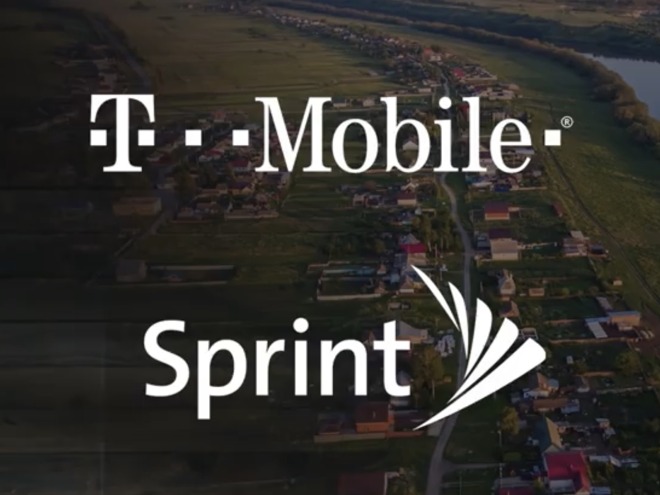T-Mobile and Sprint receive key approvals on path to blockbuster merger
T-Mobile and Sprint moved past two major hurdles on their way toward a long-fought merger on Monday, receiving regulatory approval from both the Committee on Foreign Investment in the United States (CFIUS) and a group of defense agencies collectively known as Team Telecom.

The New T-Mobile
The announcement came after months of negotiations with both companies and the federal organizations, bringing the third and fourth largest U.S. telecoms even closer to a proposed merger worth billions.
"We are pleased to achieve both of these important milestones in the journey to build the New T-Mobile," T-Mobile CEO John Legere said in a prepared statement.
CFIUS is involved with the merger operation as T-Mobile's largest owner, Deutsche Telekom, is based in Germany while Sprint's parent company SoftBank is located in Japan. The Treasury Department leads the committee tasked to review foreign deals for potential national security issues.
Collectively, the U.S. Department of Justice, Department of Defense, and Department of Homeland Security make up Team Telecom, which also signed off on the transaction, according to T-Mobile.
With the two approvals now submitted, only the Federal Communication Commission's antitrust officials stand in the way of a successful tie-up. T-Mobile said it expects to receive final approval from the FCC, and complete "customary closing conditions," in early 2019.
There has been much debate about the T-Mobile and Sprint merger, with some worried the union will reduce competition and cost jobs. Supporters, however, hope the resulting company will give the current Verizon and AT&T duopoly a strong competitor in the emerging 5G network race.

The New T-Mobile
The announcement came after months of negotiations with both companies and the federal organizations, bringing the third and fourth largest U.S. telecoms even closer to a proposed merger worth billions.
"We are pleased to achieve both of these important milestones in the journey to build the New T-Mobile," T-Mobile CEO John Legere said in a prepared statement.
CFIUS is involved with the merger operation as T-Mobile's largest owner, Deutsche Telekom, is based in Germany while Sprint's parent company SoftBank is located in Japan. The Treasury Department leads the committee tasked to review foreign deals for potential national security issues.
Collectively, the U.S. Department of Justice, Department of Defense, and Department of Homeland Security make up Team Telecom, which also signed off on the transaction, according to T-Mobile.
With the two approvals now submitted, only the Federal Communication Commission's antitrust officials stand in the way of a successful tie-up. T-Mobile said it expects to receive final approval from the FCC, and complete "customary closing conditions," in early 2019.
There has been much debate about the T-Mobile and Sprint merger, with some worried the union will reduce competition and cost jobs. Supporters, however, hope the resulting company will give the current Verizon and AT&T duopoly a strong competitor in the emerging 5G network race.

Comments
This news is just result of Sprint/T-mobile caving on the govt demand to not use Chinese wireless equipment.
The merger of T-Mobile and Sprint will be good for the consumer, as there will be three wireless carrier if approximately equal size, so the pricing pressure that T-mobile puts on Verizon and ATT will become much stronger.
T-Mobile was great. Is it going to better saddled with Sprints debt? I doubt it. Like most mergers, there will be “right sizing” also known as a wave of firings.
Sprint was the low cost wireless provider. They got their “low cost” by providing poor (see non-existent) customer service. They’d also scam you on the billing (first hand experience). They were the worst company I’ve ever dealt with anywhere.
T-mobile was the value provider that still provided decent customer service. Do they still need to bother? There’s no other competition...
Verizon is the “premium” provider. Pricy but good.
ATT is the “bundling” provider. They wanted to force consumers to have DirecTV (which has gone to crap after getting bought) and upsell content. ATT has lost about 1/3 of its market cap this last year.
All these providers are going to push 5G which consumers don’t really need, and use it as an excuse to raise prices.
Consumers having less options, and there being less competition in the industry isn’t “good” unless you’re a wireless exec.
Unless you’re referring to Google Fi... not exactly a “little guy”.
Little guys still own some cell towers, but they provide data services in remote communities were it’s not worth it for the “big guys” to operate. If your device goes on “roaming” you’re probably using the “little guy”.
There's a reason why China is pushing 5G. They know it opens the doors to the future... With a central government (rather than a bunch of bickering carriers more concerned about their own profit than technological progress) China has vision that gives it an advantage it is exploiting.
It's why the U.S. had to establish the TVA to get electricity to the Appalachian areas... The for-profits had focused on those areas that generate profit.
Sprint has always lost money in mobile phones. I worked for Sprint 17 years ago. It was horrible then and it’s horrible now. They were always the bottom feeder. They had customers with the worst credit who didn’t pay their mobile bills. The churn was awful. The service was bad. Nothing changed.
T-Mobile is getting spectrum and towers with this acquisition. The customers are not that much of a value. But, T-Mobile at this point can really do something spectacular in the US, since they are not going to be the little brother to Verizon or ATT anymore.
Out of the three companies, T-Mobile is the one that gives me the most hope.
There will definitely be some growing pains, but this will help them push into the 5G market, while still providing increased service on LTE.